It’s mid-April and as I write this, the sky outside is grey, with a forecast for showers later. However, despite the clouds, the air temperature is around 20°C. In fact on many days over the last few weeks, the daytime temperature has reached close to the mid-20s centigrade, so I can confidently declare the chilly days of winter to have passed. Time then to look back on the second part of our winter at anchor in the Rio Guadiana. Part I can be read here.
We returned from a brief stay in Ayamonte marina over New Year to our usual anchor spot, just north of the village of Alcoutim. Emerald’s lockers were bulging as we’d taken advantage of the many supermarkets in the town to do a big restock. The diesel tanks and cans were full too. At the time, we didn’t know how beneficial these fill-ups would become.

The Negatives of Our Winter At Anchor
For the last 7 years in the Med, we’d always over-wintered in a marina. There’s ample shore power whatever the weather, warm showers (most of the time), and easy access ashore.
For winter 2020-21, we were spending it afloat at anchor, with no physical attachment to shore. Let’s look at the issues that arose and get the bad stuff out of the way first.

Scotty, We Need More Power!
For power, we had to rely on what we could make from solar and wind, with a petrol generator and the main engine as back up.
During the shorter daylight hours of December, our solar panels had struggled to keep up with even our basic needs for power, and this continued into January. Grey skies and rain didn’t help matters. Frost was also a problem.

Then our Kippor petrol generator developed a fault that evaded our attempts at DIY repair. So, every other day we ran the main engine to top up the batteries and provide hot water for washing. We kept a log of the engine hours, and as January turned to February, we can see the gaps increasing between the need to use engine charging. In March, our renewable power only needed topping up once. And by the end of the month, the batteries were often fully charged by midday.
Following the demise of the generator, we were unable to use our onboard washing machine. However, this wasn’t a problem as there is a full-size machine available ashore for a few euros.
Baby, It’s Cold Outside
Unfortunately, our first winter at anchor coincided with Portugal’s coldest winter for 10 years.

Overnight temperatures regularly plummeted to near 0°C and one morning we woke to frost on the deck. The local farmers suffered losses as their newly planted seedlings succumbed to the unusual cold.
Thank goodness then for our Refleks diesel heater. We have the water jacket version which heats and feeds water to radiators. Using only a third of a litre of diesel an hour, it silently kept the whole boat toasty warm. In addition, it dried the air, which was important in the battle against mold. We generally turned it off for a few hours during the day, then fired it up as darkness fell. On the colder days, we kept it on overnight. It was bliss to wake to a cosy boat.

Misty Mornings
We’d been warned about the mist that could hang around the river valley until the afternoon. So, when one of us got out of bed in the morning, we’d look out of a porthole. If all that we could see was white, we’d hop back into bed for an hour (or so) with a coffee and a book. And on those mornings when we did drag ourselves up, there was an ethereal beauty to be found in the way the mist swirled its way from the river into the air before dissipating.
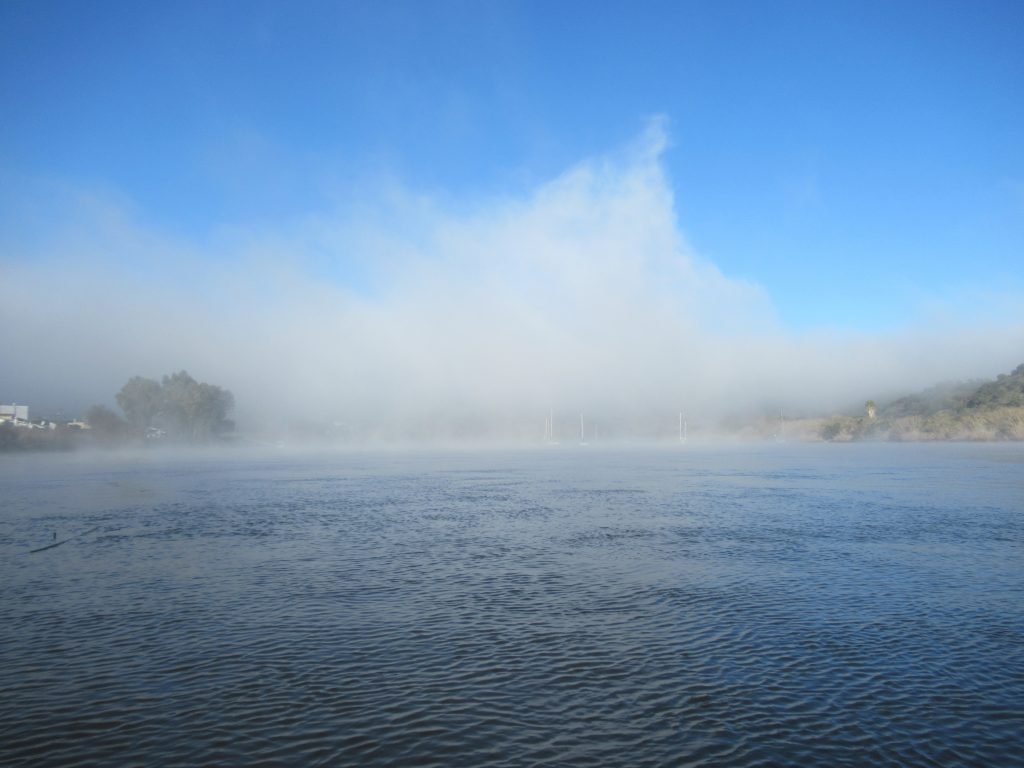
The Swamp Monsters
We’ve always used a dehumidifier to keep the more remote parts of the boat dry during winter and help against the formation of mold. It got a lot of use during our winter in Cartagena, which was particularly humid. This winter the mist made it even more so with cold on top. But, without sufficient power to run the dehumidifier as regularly as we’d like, dampness was threatening to overwhelm us. We’d often wake in the morning to drips on our heads from condensation that formed on the woodwork or headlining. The air felt horribly soggy.
We tried many alternative methods to keep condensation at bay, such as keeping a porthole open a crack for ventilation and using a fan to help move air around. We stuffed insulation into the portholes and on the deck hatch above the bed. This limited the condensation that formed there, but it would still be dripping down every other surface by morning. Every few days I’d go on the hunt for new black spots, using a mild bleach solution to kill the spores followed by a wipe with tea tree oil. It seemed to help some, however, it was an incessant battle, and any pause gave the mold a chance to gain a toe hold.

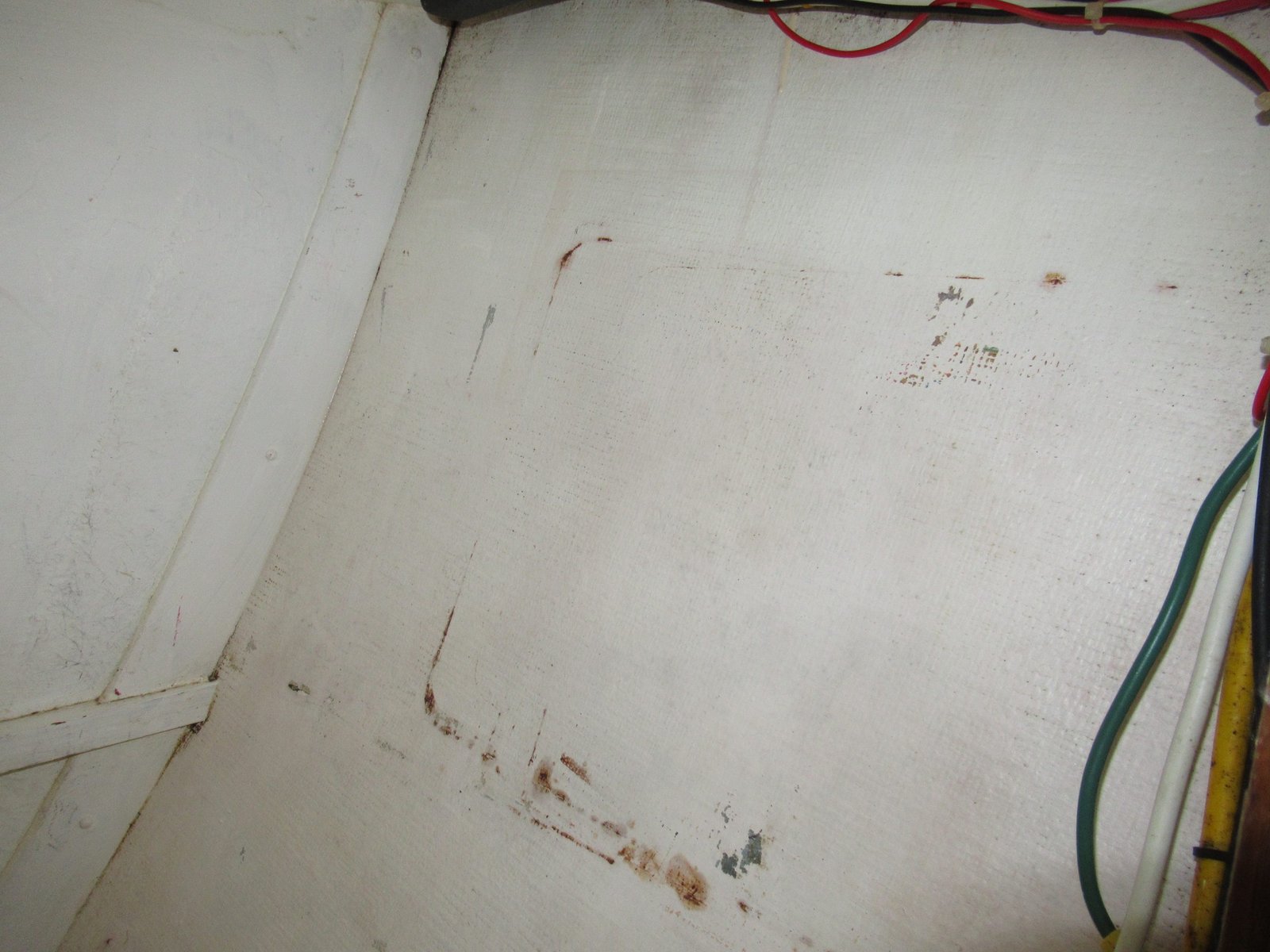
Covid Lockdown Returns
Following the relaxation of movement restrictions over the festive period, Portugal saw a surge in Covid infections. After months of zero cases, it came knocking on the door of the small village next to where we anchor. The Portuguese government declared a state of emergency on the 14th of January and imposed a full lockdown. Travel was severely limited, bars and cafes closed and only essential shops remained open.
The UK then added Portugal to their red list as the Brazilian variant began to spread. Travel between the two countries became difficult as direct flights were cancelled. And in February, anyone travelling to the UK had to quarantine in a hotel at their own cost of £1700. A no-no for small-budget livers.
In February, I marked a year since I last saw my parents. I began to question our decisions. Of course, this was self-torture, as we’d made those decisions without the benefit of hindsight.
It was expected, but still a disappointment when the festivals for which this region is famous, such as The Contraband Festival, were cancelled. And, it was sad not to be able to share our St. Patrick’s Day hats around for the second year. We made the most of it with a party for 2 onboard, flying the flags, playing Irish music loud, and wearing as many hats as possible.
What Day is It?
The border with Spain was closed, so all our groceries had to come from the Portuguese side. The only fixed agenda in our week became the weekly veggie market on a Saturday morning. Here was a chance to chat with others in the queue whilst waiting to buy our weekly veg.
The local village shop also did a grand job of keeping us provided with food staples. We were glad of having stocked up in Ayamonte, but as these supplies dwindled, we were able to find most of what we needed at Bella’s. Produce vans regularly visit the village too, selling bread and fish. There’s also a meat van, but unfortunately, the butcher broke his arm and didn’t come for several months. The main thing we missed was Cheddar cheese, but friends who drove down to the larger shops kept us stocked up. Oh, how we love our Cheddar.
No Showers
In January we began the install of our waterless loo. We couldn’t shower on the boat as the whole of the head (the nautical term for the bathroom) was under renovation. There are showers ashore, but something broke and there was no hot water for several weeks. Not pleasant at all when the air temperature is less than 10°C and a potential contributor to mutiny. So what were our alternatives?

On the warmer days, we bravely showered outside, with a plastic curtain to keep the worst of the wind chill at bay. We filled our Hozelock PortaShower*** with hot water and very, very quickly sprayed ourselves clean on the back deck.
We weren’t seeing many people due to the lockdown, so on the colder days, we simply chose to smell. Evidence that this liveaboard life isn’t all sunsets and cocktails!
Mutiny on the Emerald
The cold, the damp and mold, the lockdown, the boat in pieces and cold showers, and the prolonged separation from family. Emotions were simmering and ready to blow. Having gone ashore on a chilly day, on my return I noticed a bunch of sticks, poking out from under the outboard engine leg. Pushing up my sleeves, I reached an arm into the cold, brown water to pull them out. I got most of them, but there were others, stubbornly tangled around the outboard leg. I reached a little further, then a little further still to free the final few. It was a stretch too far. Cold water seeped up my sleeve, as I hadn’t pushed it up enough. It was a tiny thing, but it was a step closer to the mutiny tipping point.
The second time was on another trip ashore on our way to the market on a wild and windy Saturday. Storm Karim was battering the Atlantic coast and even 30 miles inland, we were feeling its force. But if we didn’t go shopping, our veg supplies would be limited. Bundled into warm clothes, we headed ashore, our AB RIB bouncing across the river chop. Close to the village, we turned across the waves to approach the pontoon and slowed down. However, at the same time, the waves increased. The combination caused cold water to slop over the tubes. I bore the brunt, the water soaking my trousers from top to bottom. Some water even found its way down the small gap between my jacket and neck. I stomped to the market, dripping as I went, the cold wind adding to the chill. Mutiny point two.

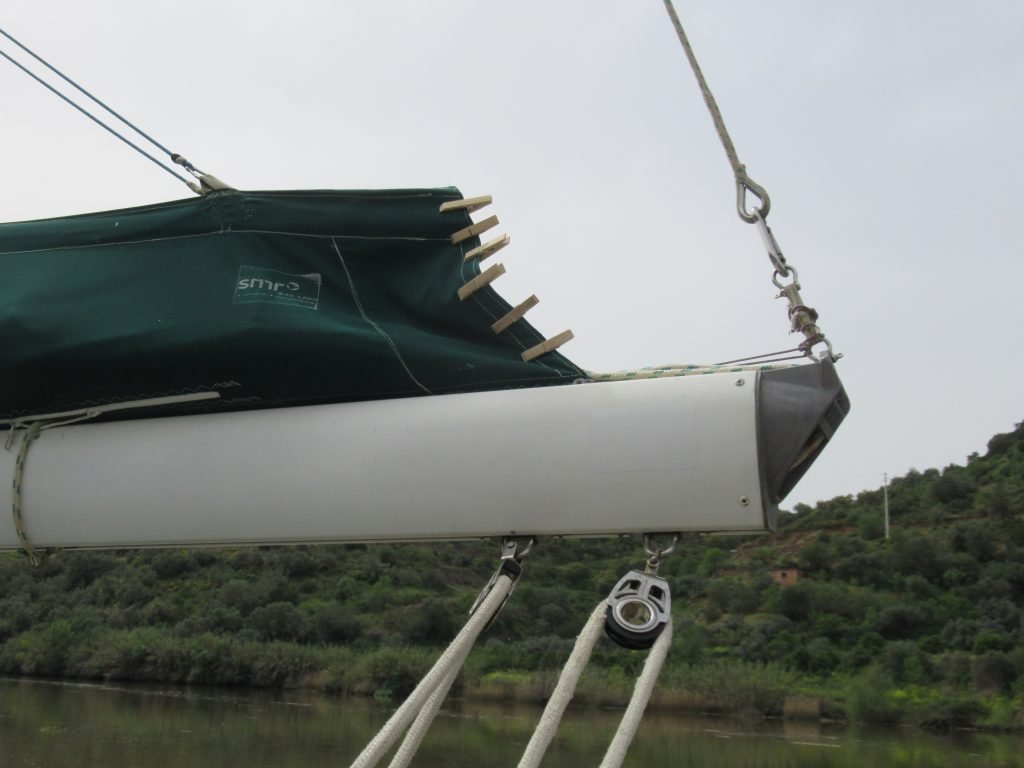
The Positives of a Winter At Anchor
At those times, I thought enviously of those in their marinas, who could just step off the boat or walk a short gangplank to get ashore. Thankfully, those are the only two moments that stick in my mind. And within a short time, there was something to bring me back to enjoying our winter afloat.
The Ideal Time to Get on With Boat Jobs
With little else to distract us, it was the ideal time to get on with some of the jobs on the long list of boat jobs.
- The main and most time-consuming job was the removal of the pump-out toilet and replacement with a waterless one. Two months in and we’re very pleased with the new loo. There’ll be a blog about it coming soon.
- We began removing the old Coelan coating from the external woodwork and recoating with International Woodskin***
- The annual engine service.
- Repair of corrosion due to dissimilar metals in the boom kicker (also known as a vang).
- Installation of a Victron Energy Battery Protect*** switch. Our hot water heater now automatically switches on whenever there is excess solar power.
- Replacement of a Current Voltage Power LCD Display*** to allow us to monitor the output from the wind generator.
- Battery maintenance and rotation.


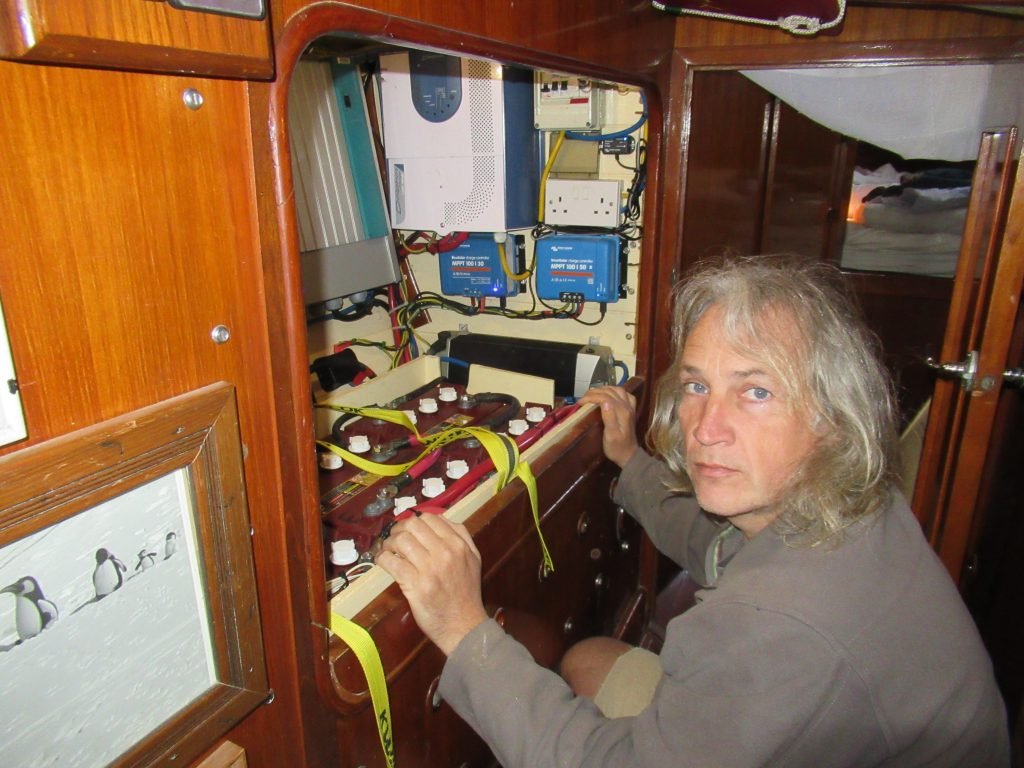

Time for Hobbies
I began crocheting a blanket during last year’s lockdown but had neglected it during the summer. The colder weather and lack of other distractions, gave me an incentive to get it finished whilst I could enjoy the benefit of snuggling under it on an evening.

We had more time for cooking onboard, warming up the boat with a roast dinner on a cold day and experimenting with sourdough. We had crumpets, banana bread, brownies, fluffy pancakes, and hot cross buns as well as my regular pizza base and flatbreads. If Bruce and Deirdre are reading, thank you for the starter, Baby Michael had a little accident at sea but the grand-baby of Michael Bubble is going strong.
All those calories though, which brings me on to the next topic….
Alcoutim Kept me Sane
Being able to get out for regular walks was a huge improvement over 2020’s lockdown experience in Spain. The nature here is stunning, with every few weeks something new springing forth. First, it was the almond blossom in January, sprinkling the hillsides with candyfloss pink and white. Next came the wildflowers, first as tiny orchids carpeted the land, then rampantly painting the empty fields with colour. Right now, the colours white and yellow are competing for attention across the countryside. White from the millions of cistus flowers that wave their heads at us whilst gorse provides the yellow.
Alcoutim is a small village with a lovely community, so most times that we go ashore, we’ll see someone we know. Lockdown chats whilst socially distancing helped break up the days, especially the gloomy ones. A favourite interaction was with an elderly man out taking a gentle stroll who I regularly saw during my walks. I’m studying, but my Portuguese is still very lacking, but we’d share a “bom dia” or a “boa tarde” with a wave. One day we progressed beyond that. I understood a few words, but mostly it was the gestures as he excitedly mimed getting his Covid jab. It warmed my cockles.
In addition, I found the timing of this year’s lockdown to be much better than last year’s. With colder weather, we were less inclined to want to go out as often. Last year, the lockdown didn’t begin until mid March, as the weather began to warm up. This year it began in January and staying inside in the cosy boat wasn’t as much of a hardship.
The Money Saved
The marinas in the Algarve are some of the most expensive that we’ve come across in southern Europe and the Med. Even with winter deals, we’d be looking at around €3000 for a 6-month stay. So, despite a higher diesel usage (for heating and engine-driven battery top-up), we’ve made a huge saving by remaining at anchor. We can now invest the money in the boat or even better, spend it on fun!
Would I Do Another Winter At Anchor?
This blog may come across as a moan-fest, but the answer to “would I spend another winter at anchor” is a resounding YES!
Many of the issues we faced can be resolved or were unique to this year.
- We would need to improve our power-creating capabilities. However, we are more likely to invest in solar than replace the petrol generator, given that this winter was the first time we’ve used it in several years. It makes more sense to us to upgrade the solar panels we have for use in the future. Higher wattage panels are now available, from which we would be able to extract more from the available daylight hours. We’d continue to use the engine for battery top-ups, but hopefully much less often.
- The damp. We could keep the heater going during the day and if we had better power management, we could run the dehumidifier more often.
- The cold. This was an unusually cold year, so we’d hope it was unlikely to happen again in the near future. And if it did, I now have a super snuggly blanket to hide underneath. And having experienced plenty of bad weather days during the winters in a marina, there isn’t much difference where you are if the weather is so bad that you can’t go out.
- Covid – nothing is certain anymore in the Covid world. However, with the roll-out of vaccines, we can hope that any future lockdowns will not be so severe. And if lockdowns did happen again, the Rio Guadiana is a good place to sit them out.

*** These links are to my Amazon Affiliates Program. There is no cost to you, but I may make a small amount from any qualifying purchases.
The Social Media Bit: Want to Follow Us?
If you’d like to follow us on other social media platforms (Facebook, Instagram and YouTube), you can do so by using these links:
Or use the link below to track our voyage on NoForeignLand.com.
And finally, you can sign up to receive email notifications of new blogs using the subscribe box at the bottom of this page.
Thank you from Nichola & Colin


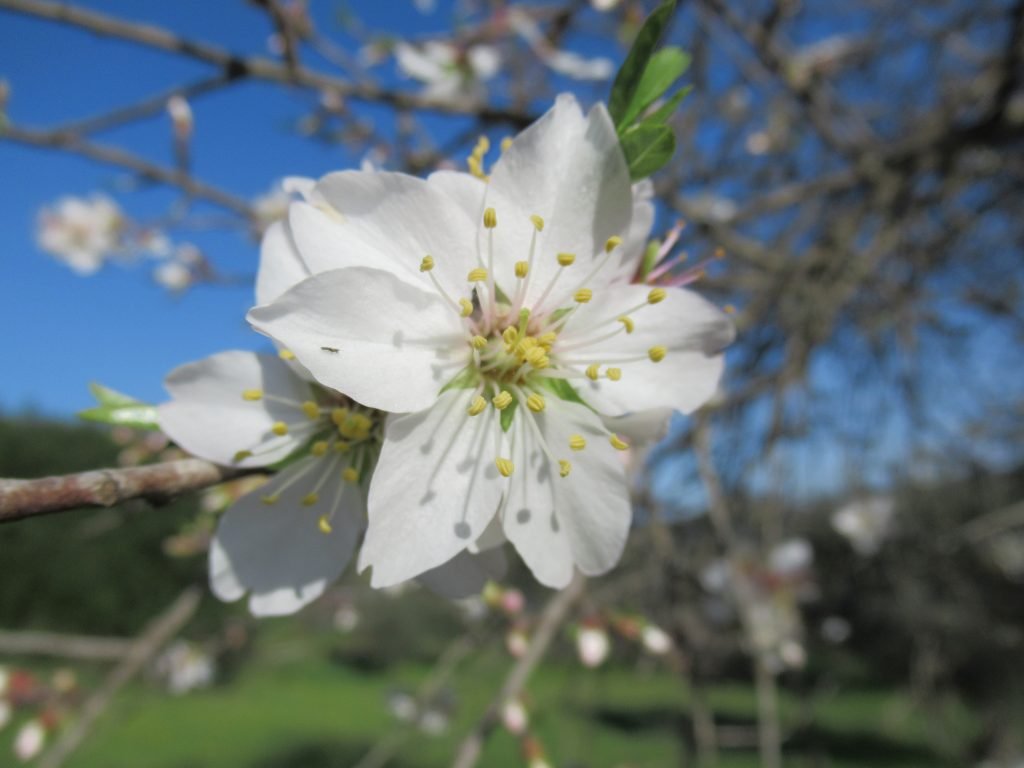
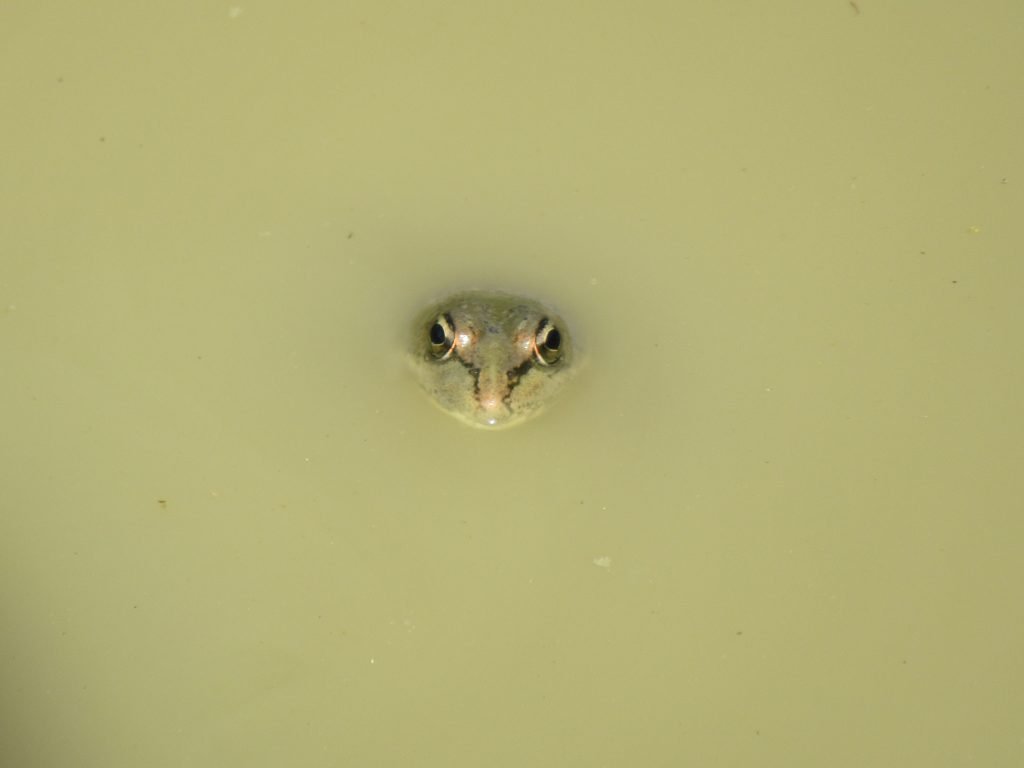
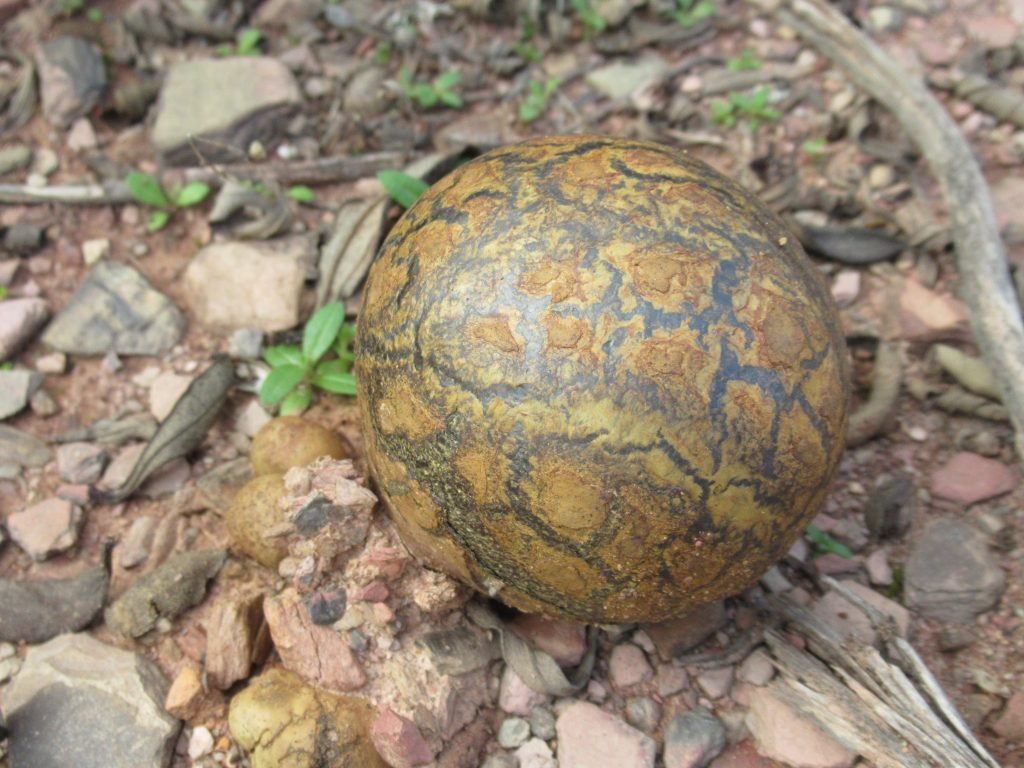
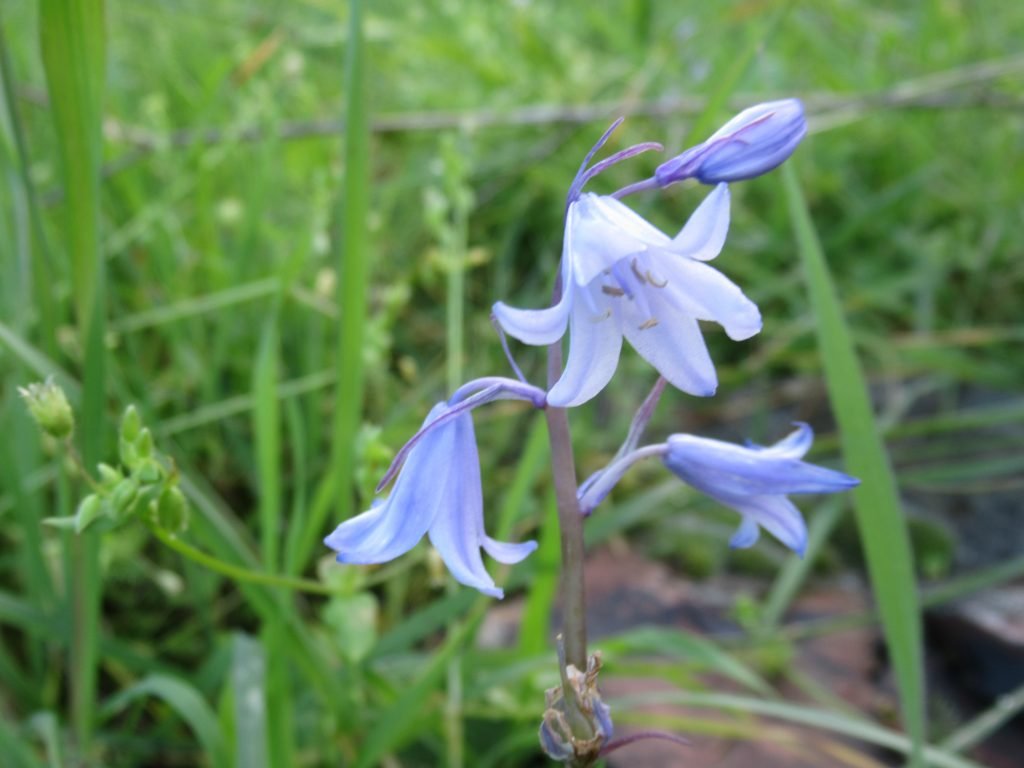
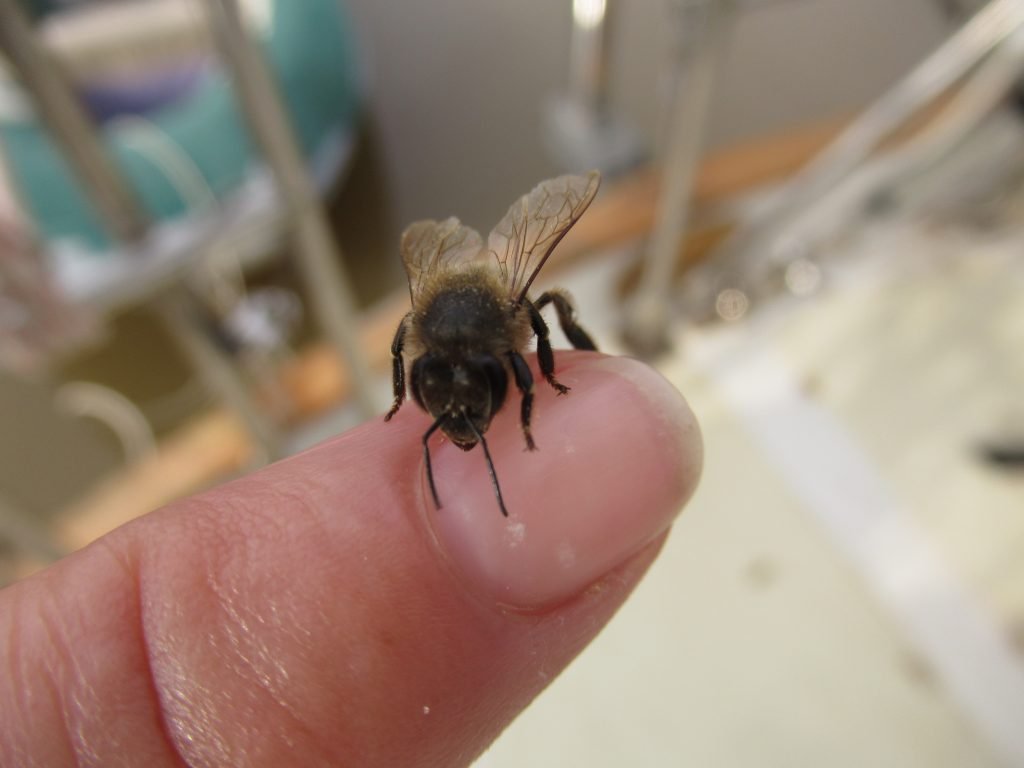
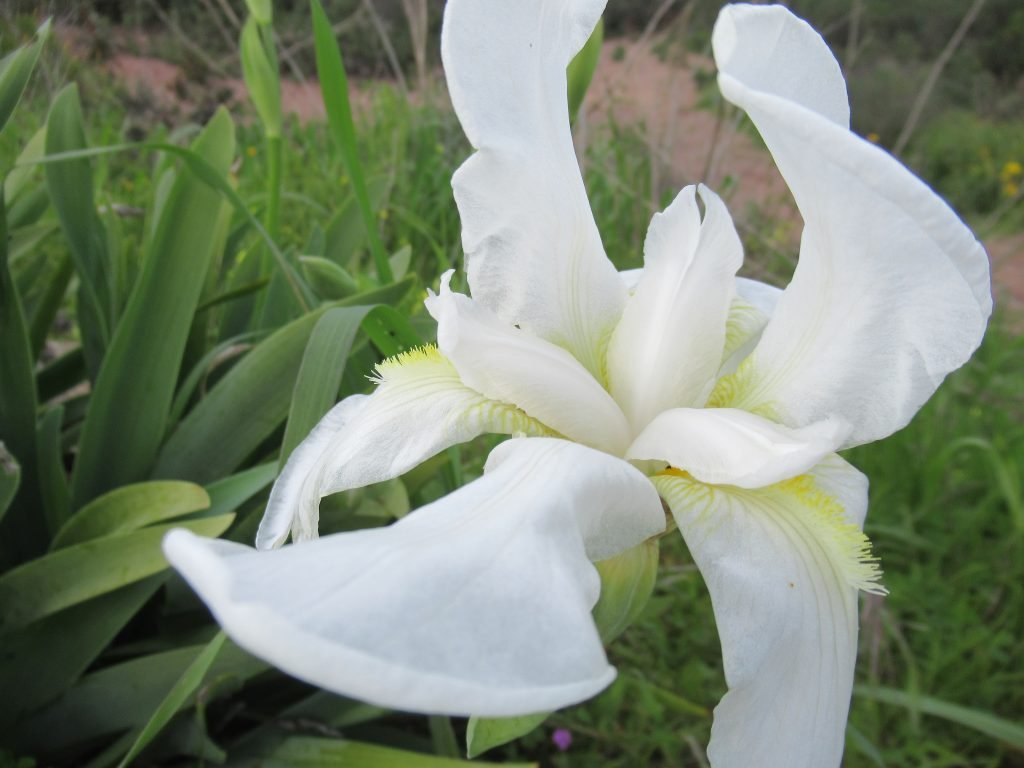

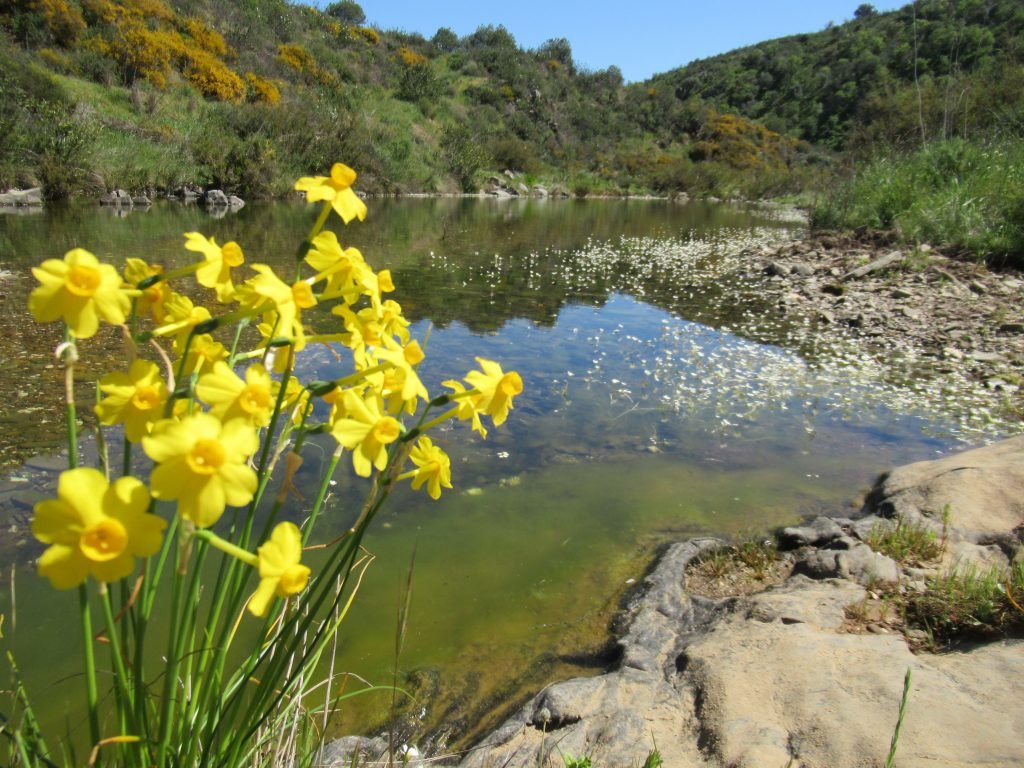

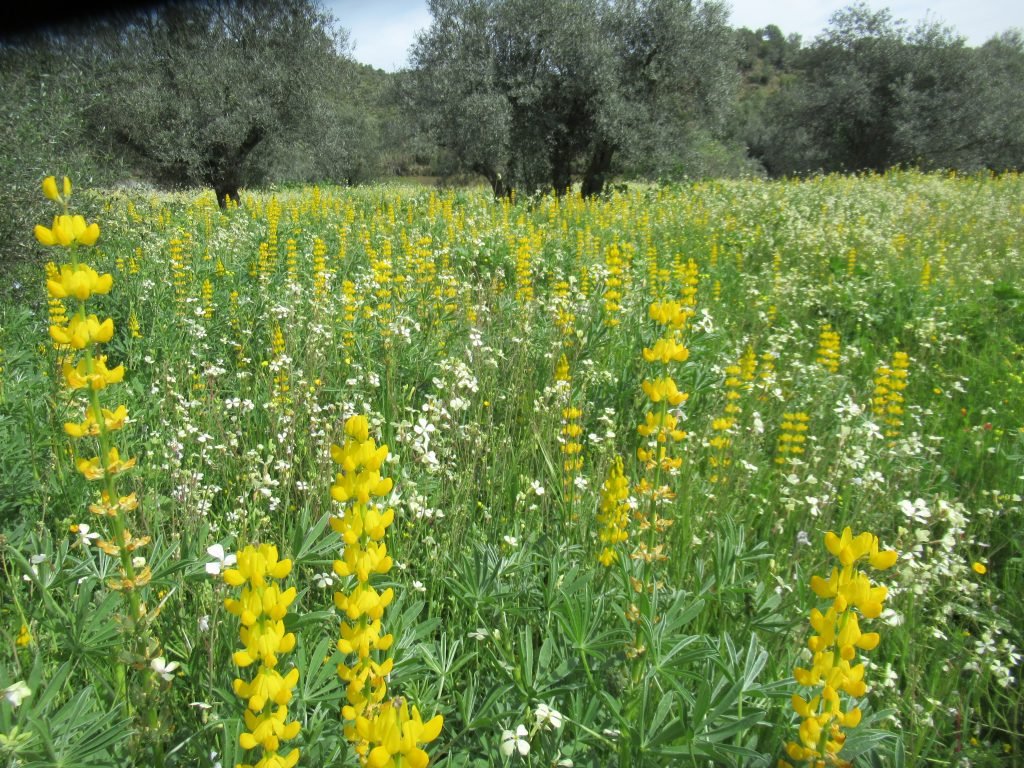
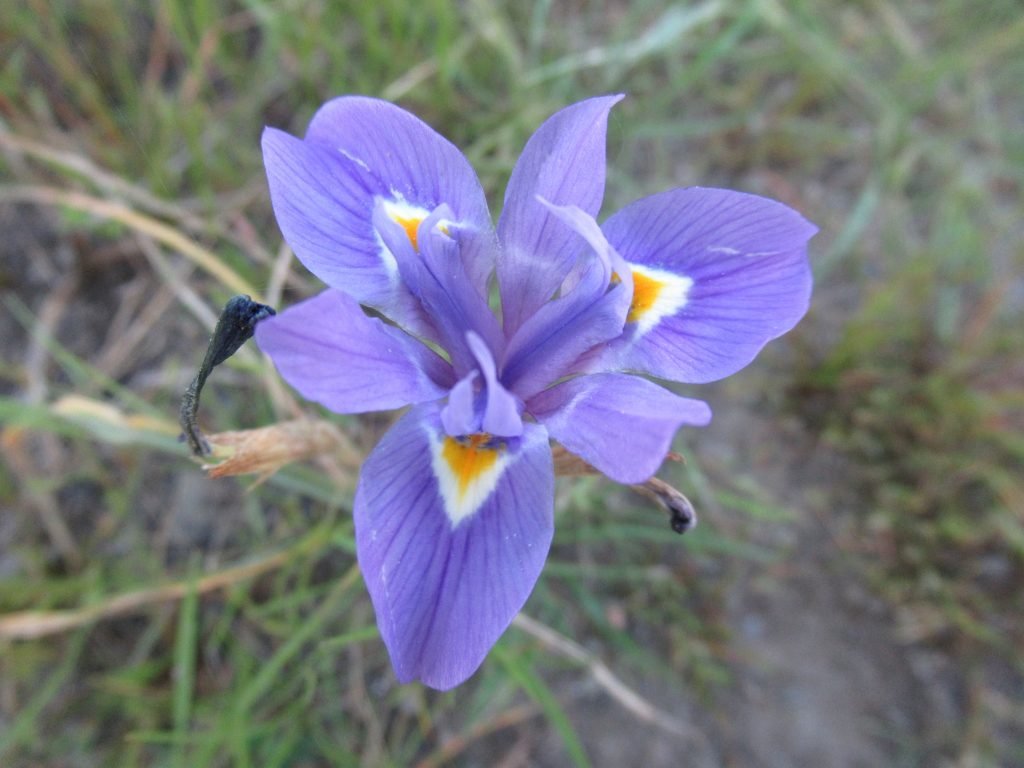

Well done you two. You made it!! Must have been tough at times though but you are both so resilient!! Hopefully we’ll get to meet up this year. Miss you both xxx
It’s been far too long! Fingers crossed for a get together this year xxx
So glad to hear that grand-baby of Michael Bubble is alive and well (and probably delicious)
Maybe one day we’ll be able to have pizza together again!
Well done surviving on anchor guys in the cold European winter.
Thank you! I don’t think I would have managed without a good heater
Pingback: What Next for Emerald, Having Escaped Porto Santo?